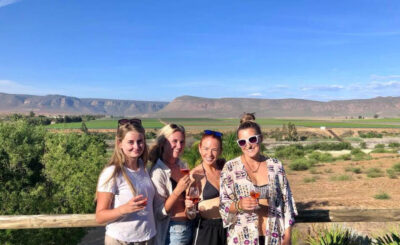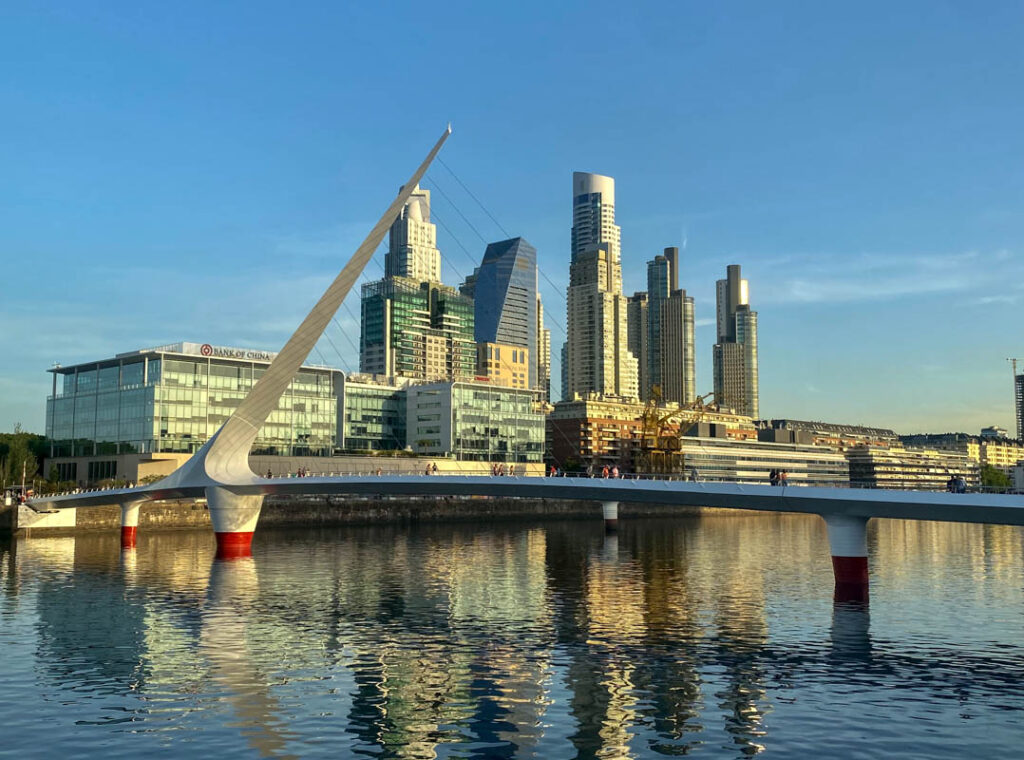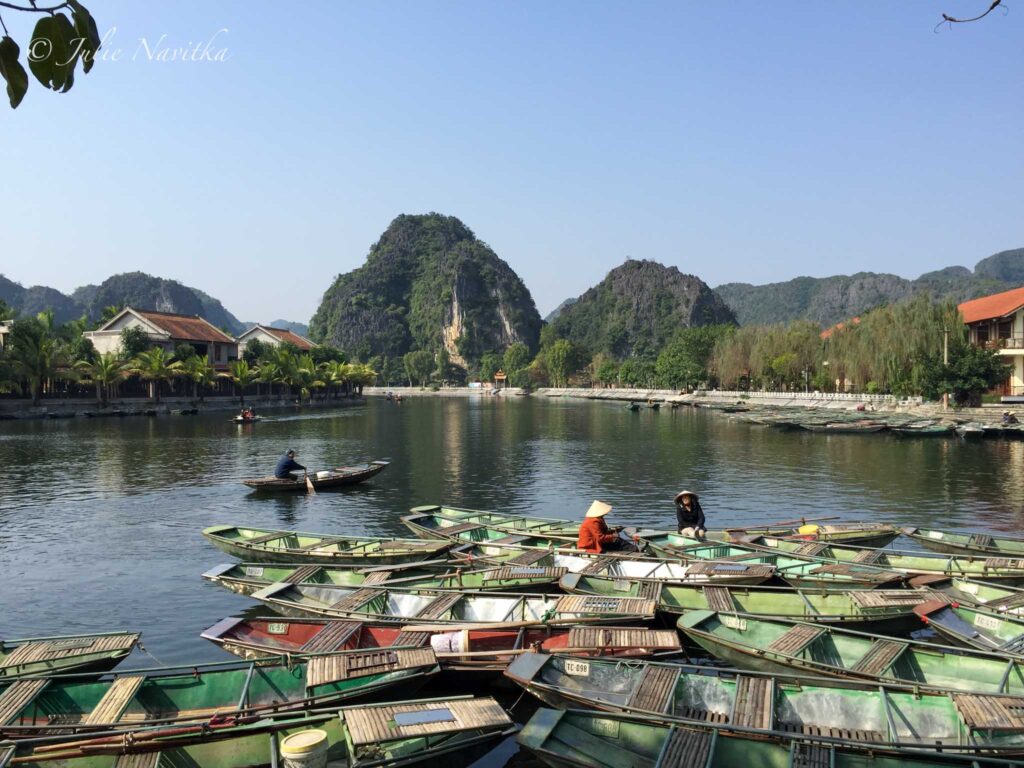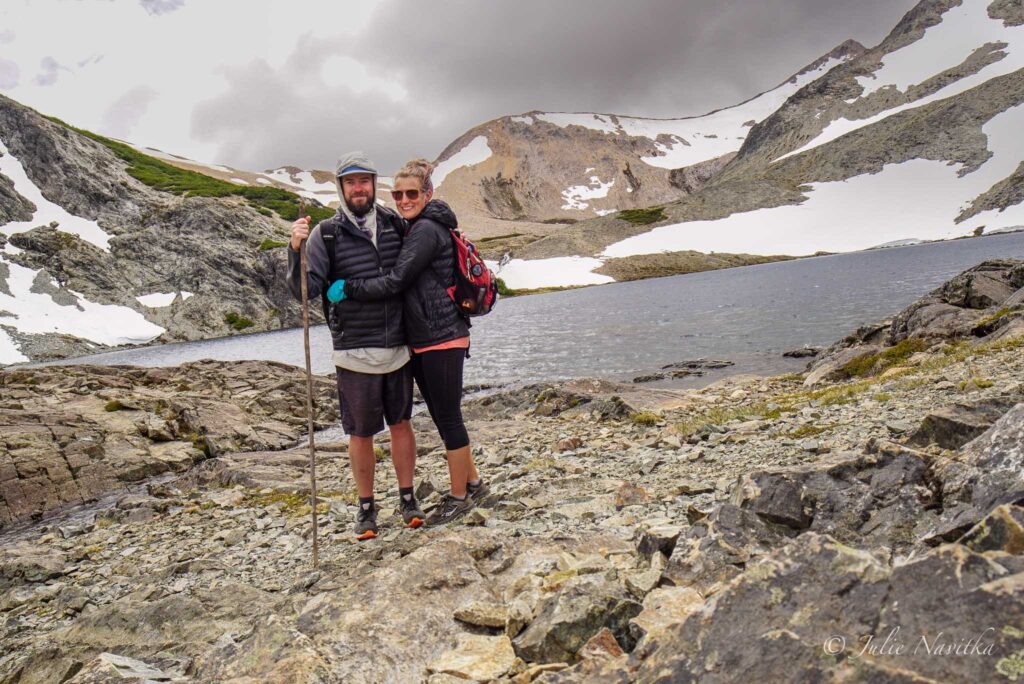Sustainable Wine Brands and Eco-Friendly Winery Tours
Estimated reading time: 17 minutes
Over the last couple of decades, winemakers all over the world have been adopting more sustainable practices. Sustainable wine brands are now seeking certification to showcase their care for the environment and their workers. From organic farming to biodynamics, water conservation techniques, and focus on biodiversity, some vineyards are accurate models of an interconnected, waste-free, natural, and circular ecosystem. Whether you’re headed to your nearest bodega to grab a few bottles for a dinner party or hoping to take some eco-friendly winery tours on your next sustainable vacation, we have suggestions!

Certifications for Sustainable Wine
One of the easiest ways to spot wines from eco-friendly wineries is to look for certifications. There are various certifying bodies in different countries, but here are a few from the U.S. and some globally recognized ones to look for:
- Wine must meet the USDA organic farming and production criteria as well as the requirements of the Alcohol and Tobacco Tax and Trade Bureau to be labeled a Certified Organic wine brand. Before wine can be sold as organic, both the growing of the grapes and their conversion to wine must be certified.
- Another seal for sustainable wine is Demeter’s “Certified Biodynamic.” Based on the ideology formed by Rudolf Steiner, biodynamic vineyards touting this certification view the entire vineyard and estate as a living organism. Moon phases dictate harvest timing, and fertilizing soils with herbs, minerals, and manure is common. This is a globally recognized certification.
- The non-profit organization, LIVE, is an internationally accredited standard with strict criteria for vineyards and winemakers. Records must be up to date and reflect maintenance of biodiversity, irrigation and fertilizer use, energy use, water management, labor conditions, and emissions must be also be provided.
- More than 1,000 vineyards are LODI Rules certified worldwide. The independent third party Protected Harvest audits and certifies vineyards with LODI Rules, created by a group of farmers called the Lodi Winegrape Commission in 1991. Wineries must have their vineyards certified annually and may only use the LODI Rules seal if at least 85% of their grapes come from certified vineyards.
- Another label to look for is Environmental Management Systems (E.M.S.) ISO 14001/14004, which focuses on minimizing environmental impact and waste reduction. This label is especially prominent in Chilean and Australian wines.
- The Sustainable Wine South Africa certification is a common postage-sized label on the bottleneck of sustainable wine brands hailing from South Africa. The label has an image of the protea, the country’s national flower, and a number that allows you to track the wine’s sustainability and origins.
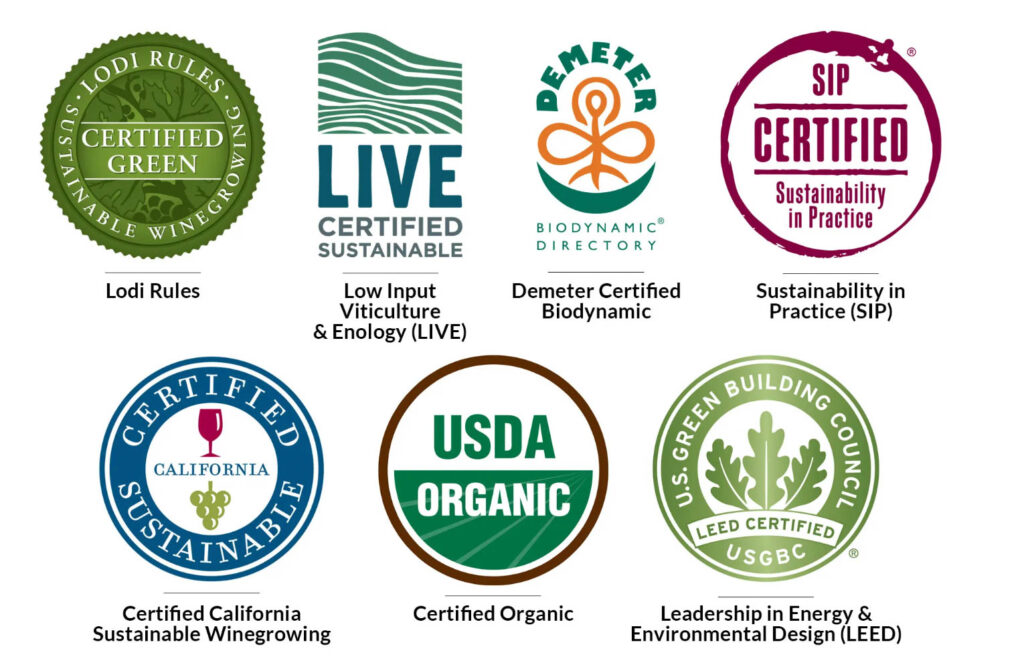
Eco-Friendly Wines from North America
Soter Vineyards, Carlton, Oregon
Certifications: Demeter Certified Biodynamic, CCOF Certified Organic, LIVE Certified Sustainable, Salmon-Safe

This 240-acre farm and vineyard in the heart of Oregon’s Willamette Valley is run following the principles of biodynamics, treating the farm as a whole, living organism. They do not use synthetic herbicides, fungicides, pesticides, or G.M.O.s, instead relying on compost for fertility and animals for pest control. A few examples are using ladybugs and wasps to combat pests like aphids and working with a falconer to provide bird abatement. Other animals contributing to their closed-loop system of biodiversity are chickens, sheep, goats, ducks, and dogs and donkeys for friendship.
Taste & Tour Experience
There are two different eco-conscious wine tasting experiences at Soter Vineyards:
- The Provisions Tasting: a guided culinary experience in which the head chef sources nearly 100% of the ingredients from the Mineral Springs Ranch. Pairings change weekly and represent the seasons of the farm. Cost: $150 per guest; max parties of 6 (six)
- Classic Tasting at Mineral Springs Ranch: a wine specialist will guide you in a private and intimate tasting of five different wines while teaching about the region’s history and biodynamic farming techniques. Cost: $45 per guest, including a $10 booking fee. The remaining $35 tasting fee is waived with a two-bottle purchase per tasting fee.
Flat Rock Cellars, Jordan, Ontario
Certifications: Sustainable Winemaking Ontario Certified
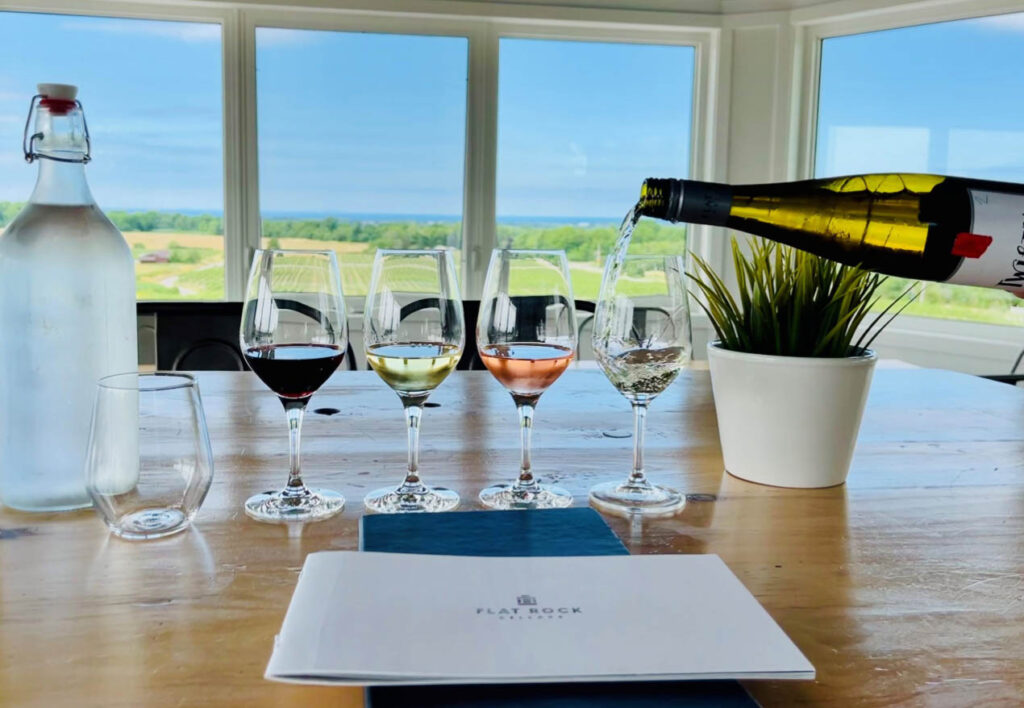
Flat Rock Cellars takes sustainability into account in almost all aspects of winemaking. They employ geothermal systems for heating and cooling, clean with ozone to reduce chemical use, and use lightweight glass to minimize carbon footprint, to name a few. Low-impact and sustainable viticulture practices are used to manage the vineyard. Their gravity-flow system allows them to sort the hand-picked grapes without using pumps, and below-ground barrel cellars are naturally insulated, conserving energy use at the winery.
Taste & Tour Experience
With four different sustainable wine tasting and touring options, you will surely find one that suits your fancy!
- Flat Rock Tasting: learn about the unique terroir and vinification methods in a luxurious, intimate setting. Sample four wines from the tasting menu while you take in the views of the vineyards and Lake Ontario. Cost: $20 CA per person
- The Library Tasting Experience: take a trip to the cellar and library while you sip on sparkling! Enjoy the accompanying cheese while you taste from a selection of wines dating back twenty years. You may even have the opportunity to purchase a wine from the library! Cost: $60 C.A.
- Winemaker’s Boots Tour: Flat Rock Wine’s winemaker will take you to the cellar and teach you about different production methods and a behind-the-scenes look into winemaking. Cost: $60 CA per person
- Backstage Tour: taste three different sustainable wines in different locations on the property guided by a staff member who will give insights into the vineyard and cellar operations. Cost: $25 C.A. per person
Tablas Creek Vineyard, Paso Robles, California
Certifications: Biodynamic certification, World’s first Regenerative Organic Certified™ vineyard in 2020, and the first Regenerative Organic Certified™ Gold vineyard in 2022

A partnership between two families in the international wine community formed in 1987 to bring you this vintage grown eleven miles from the Pacific Ocean. Certified organic since 2003, practices emphasize quality through dry farming, moderate crop levels, planting cover crops, composting, and creating a habitat for plant pollinators. Tablas Creek introduced biodynamic techniques in 2010 with the use of sheep and alpacas, and certification followed in 2017.
Tours & Tasting Experience
You can reserve a private table outside or sit at the tasting bars inside to enjoy a seated flight tasting. You can take a guided tour to appreciate the biodiversity of the vineyard, grapevine nursery, and winery at no additional cost to the tasting.
Cost: $25 U.S., fee waived with two bottle purchase
Silver Oak, Napa Valley, California
Certifications: LEED Certified, Sonoma County Sustainably Farmed Grapes, NAPA Green Certified Winery and Vineyard, Sustainable Winegrowing Leadership Award California, International Living Future Institute
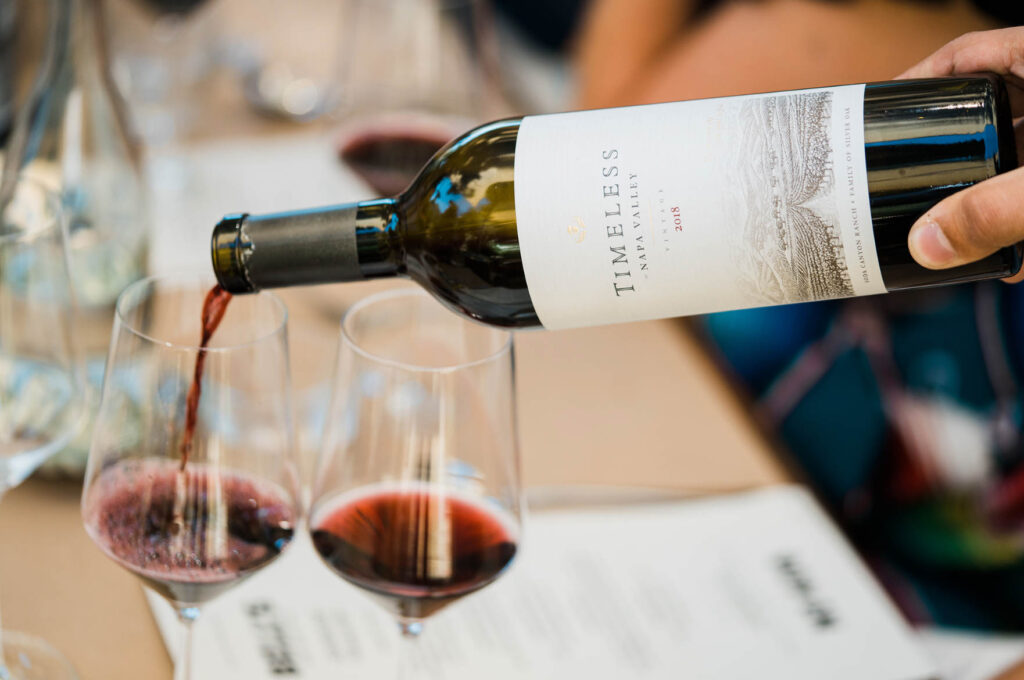
Silver Oak’s flagship wineries are the world’s first production wineries to achieve LEED Platinum certification, the highest level of accreditation from the U.S. Green Building Council. At their Oakville and Alexander Valley Wineries, water conservation takes priority. One of their many strategies in this area has resulted in an 86% reduction in irrigation and a 26% reduction in indoor water use. Nearly half of their energy needs come from solar panels, and both wineries feature Electric Vehicle Charging Stations.
Tours & Tasting Experience
With two locations to visit, you must call to make a tasting reservation at the Napa Valley or Alexander Valley wineries.
Brooks, Amity, Oregon
Certifications: Demeter Certified Biodynamic, B Corporation, 1% for the Planet, ecologi, Earth First Commerce
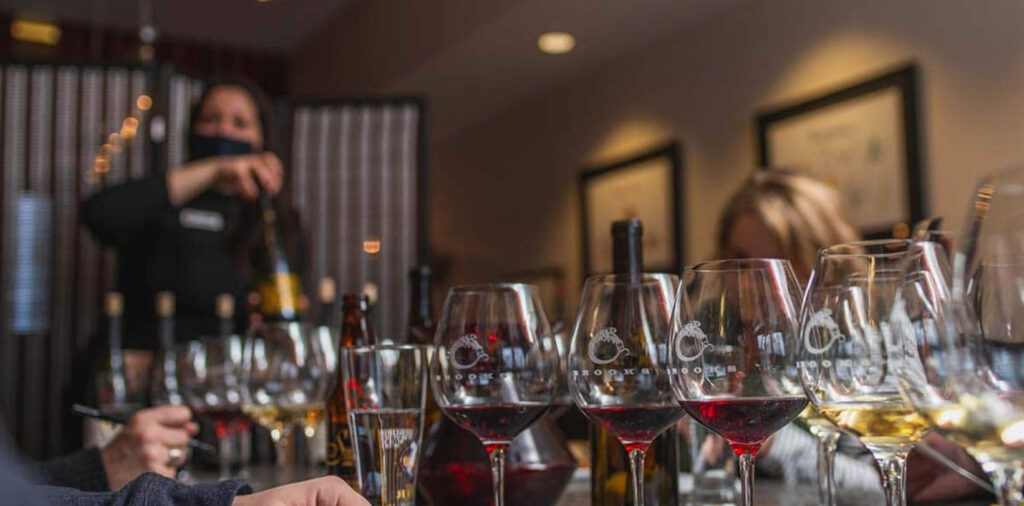
Brooks takes biodiversity seriously, with 10% of their land base dedicated as a biodiversity reserve for insectaries, hedgerows, flowering cover crops, perennial plantings, and wildlife corridors. Understanding the life cycle of pest species and adjustments to soil fertility conditions allows mechanical weed control rather than chemical. Dry farming without irrigation also conserves water at this environmentally friendly winery.
Tasting & Tour Experience
The Brooks tasting experience and eco-friendly wine tour sounds like a ton of fun! You’ll tour the production hall, barrel room, and garden while discovering the history of Brooks wine before you learn about the essential wine components. Then you will apply your new knowledge during a tasting of four different wines while you enjoy a fromage and charcuterie plate and a Paco Board prepared for each guest.
Cost: $50 U.S. per person, 90 minutes
South American Sustainable Wine Brands
Emiliana Organic Vineyards, Santiago, Chile
Certifications: Regenerative Organic Certified, ISO 14001 certification, I.M.O. certification, Sustainability Code of Wines of Chile, CarbonZero certification, Vegan Certification (Vegan Society), Fair Trade (F.L.O.) certification
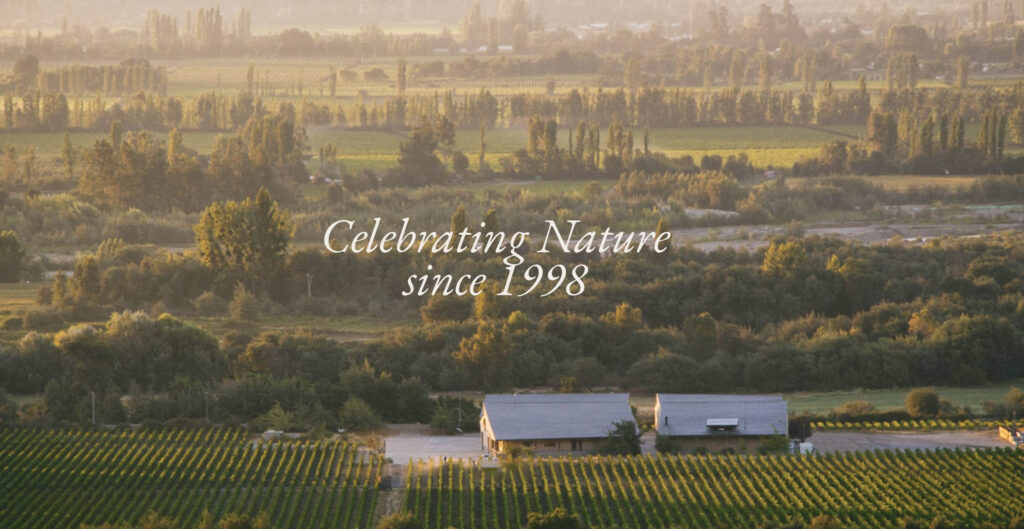
Emiliana deeply respects nature and people, with I.M.O. and Fair Trade (F.L.O.) certification for social responsibility, which includes favorable labor conditions for workers. Grapes are grown without G.M.O.s or toxic agrochemicals, and Emiliana was the first winery in Chile to obtain the ISO 14001 certification for environmental management. In biodynamic agriculture, plants grow in living, healthy soils, and Emiliana promotes this health through lack of chemical use, compost, animal integration, cover crops, and crop rotation.
Taste & Tour Experience
Emiliana is still working on the last details before doors reopen at Casablanca Valley. You can take an online interactive tour of the vineyard here.
Masi Tupungato, Mendoza, Argentina
Certifications: Environmental Management Standard ISO 14001, Health and Safety at Work managed by Masi through the ISO450001 International Standard

Care and respect for the environment are part of the Masi culture and philosophy. The use of rainwater for irrigation, natural fertilizers, and anti-parasites are just two such ways they respect the Earth. Careful cultivation practices favor biodiversity to improve the relationship between the environment and vine while allowing for natural control of pests. Masi makes their wine without the use of any products of animal origin and also focuses on waste reduction in the bottling and packaging processes.
Taste & Tour Experience
While visiting the estate, you can taste three different sustainable wines with or without a cheese pairing. On the tour, you will see the environmentally friendly vineyards followed by the grape drying loft – a method unique to South America. You can then visit the nature reserve and the barrel cellars, where you will see water pouring over one of the stone walls, a technique to maintain natural humidity and temperature.
Cost: not available on the website; contact the winery for information.
Earth-Friendly European Wine Brands
Loimer, Langenlois, Austria
Certifications: respekt-BIODYN
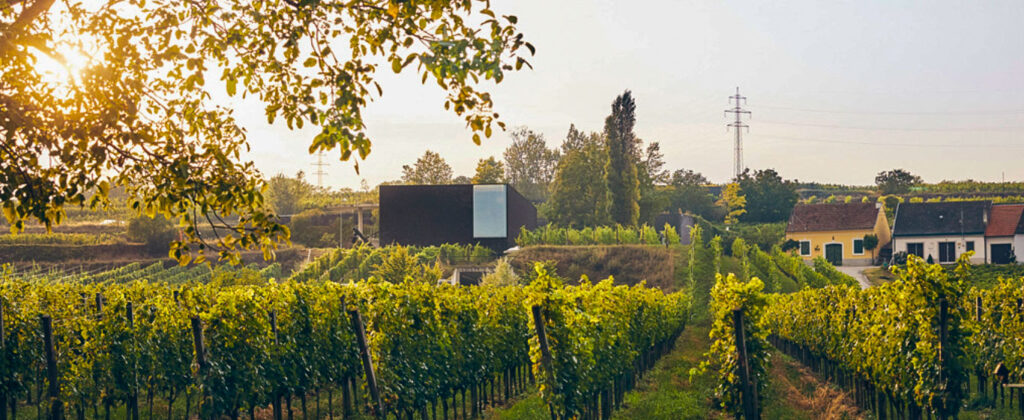
Another vineyard practicing biodynamics, with Fred Loimer co-founding respekt-BIODYN in 2007, a community that consistently implements and lives biodynamics in viticulture. At Loimer, every single aspect is part of the system – the vineyards, buildings, animals, plants, and even the people. Reliance on manual work in the vineyard and careful soil handling promotes the diversity of plants and animals. With meticulous attention to natural composting, nutrients are delivered without using chemical fertilizers at this vineyard dedicated to sustainable practices.
Taste & Tour Experience
Tastings on request only, please contact the winery.
Badia a Coltibuono, Gaiole in Chianti, Italy
Certifications: Delinat Guidelines for Organic Winegrowing
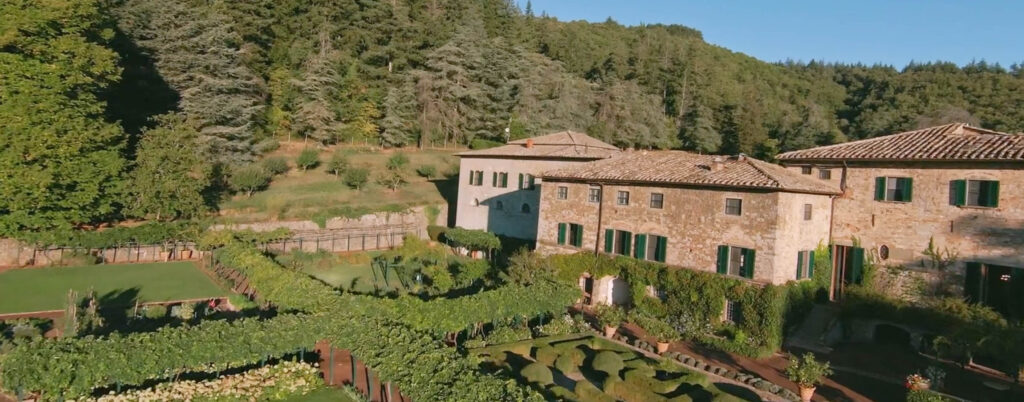
From the Latin Badia a cultus Boni, meaning “good cult,” “good culture,” “good agriculture,” or “good harvest,” this vineyard holds true to its name. Badia a Coltibuono began its journey and conversion to organic practices in 1985 by eliminating herbicides and pesticides and became organic certified in 1994 (olive groves) and 2000 (vineyards.) They promote conservation in winemaking by avoiding monocultures, managing cover crops, composting, increasing biodiversity, and not consuming more water than rainfall collected in the soil.
Taste & Tour Experience
There are so many ways to experience Badia a Coltibuono’s sustainable wines! Choose from Chianti Classico tastings and the Tuscan E.V.O. oil tastings to a visit to the family restaurant, a cooking class, or a three-day cooking experience. The Cooking Experience includes three nights in Camera Classic (garden view), including breakfast and dinner, with days spent learning about the wines and trying your hand at bread and pasta making.
Cost: tastings, tours, and experiences vary on the type chosen.
Château Maris, Felines-Minervois, France
Certifications: EcoCERT, B Corporation, Demeter
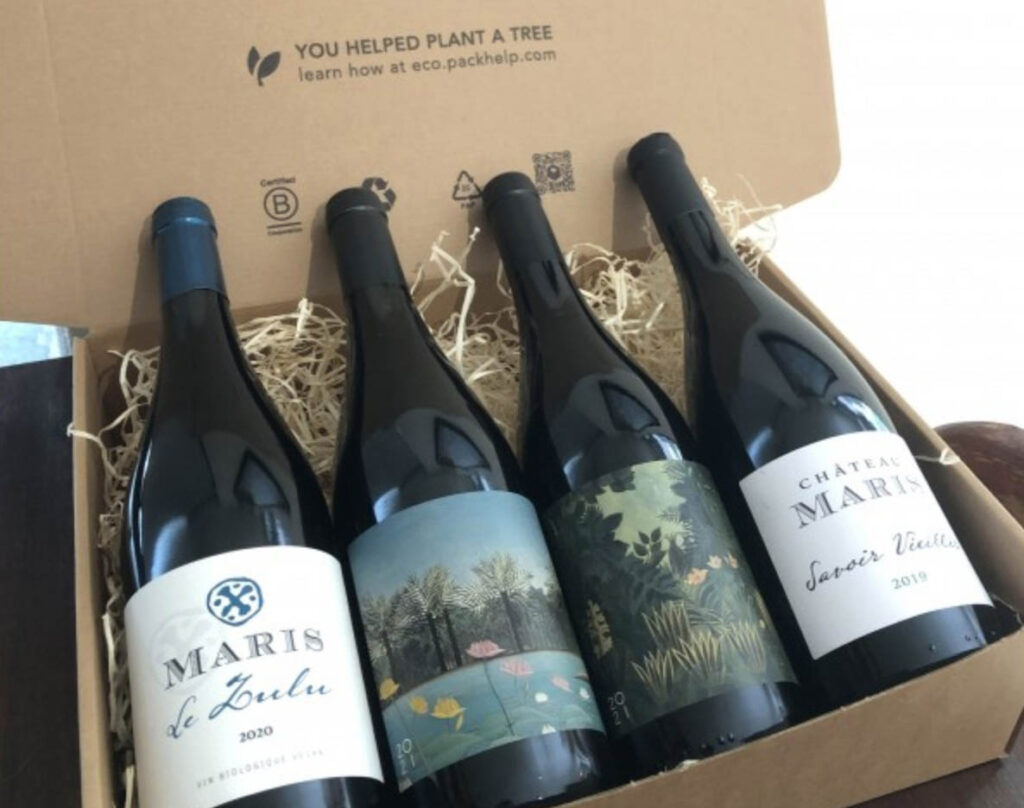
Numerous sustainability practices in energy and water conservation at this vineyard have led to a 21.5% reduction of CO2 emissions from 2107-22, with 80% of electricity provided by renewable energies. At Chateau Maris, biodynamics is a way of life taken quite seriously, with attention to every detail, such as lunar and solar cycles dictating harvest times. In their own words, “By restoring virtuous circles within the soil, between the soil and the plant, the plant and the sky, Man and the elements, we can preserve our environment for future generations, but also produce purer, finer and more elegant wines.”
Taste & Tour Experience
Taste four of Chateau Maris’ sustainable wines after taking a short walk in the vineyards and visiting the unique hemp zero-carbon cellar while learning about the wine region, the history of the vineyard, and biodynamic methods. You can also request a picnic in the vineyard prepared by their on-site chef!
Cost: 12 euros, 60-90 minute tour
Sustainable Wines from Other Regions
Boschendal, Western Cape, South Africa
Certifications: SIZA certification, GLOBAL G.A.P., G.G.N. label, WIETA Member, I.P.W. certified, WFPA Member
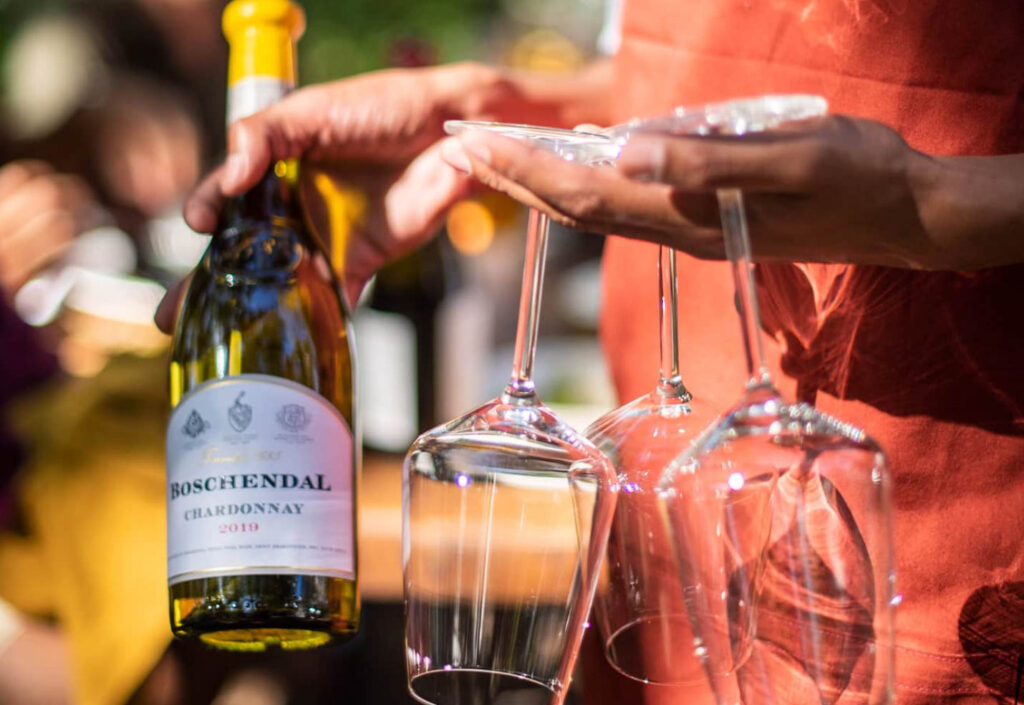
Boschendale is committed to sustaining biodiversity as W.W.F. Conservation Champions while actively working to conserve 700 hectares of their farm in alignment with The Greater Simonsberg Conservancy. While employing regenerative, safe, socially, and environmentally friendly farming practices, they also continually improve water and energy efficiencies. A unique aspect of Boschendale is its Excelsior Preschool and inclusive early childhood development center for preschool children of employees. Here, children benefit from the Montessori-inspired program, including such activities as singing, math skills, stories, music, movement, and cooking lessons.
Taste & Tour Experience
If visiting for the day, you can choose between two different tastings:
- Cellar Door Wine Tasting: an outdoor tasting of award-winning wines under a giant oak tree overlooking the Heritage Rose Garden—platters of farm produce, chocolate, cheese, and charcuterie available.
- Breakfast Canape and Wine Pairing: sip on wines and bubbles while you enjoy handmade breakfast canapes
If you want to extend your visit to Boschendal, you can book various luxury farm cottage accommodations or their spectacular mountain villa. You can join a guide through the orchards and mountain fynbos, explore the world-class mountain biking and hiking trails, taste sustainable wine, or relax in the beautiful landscape. Don’t forget to pack your sustainable luggage and eco-friendly travel toiletries!
Cost: Varies on options chosen.
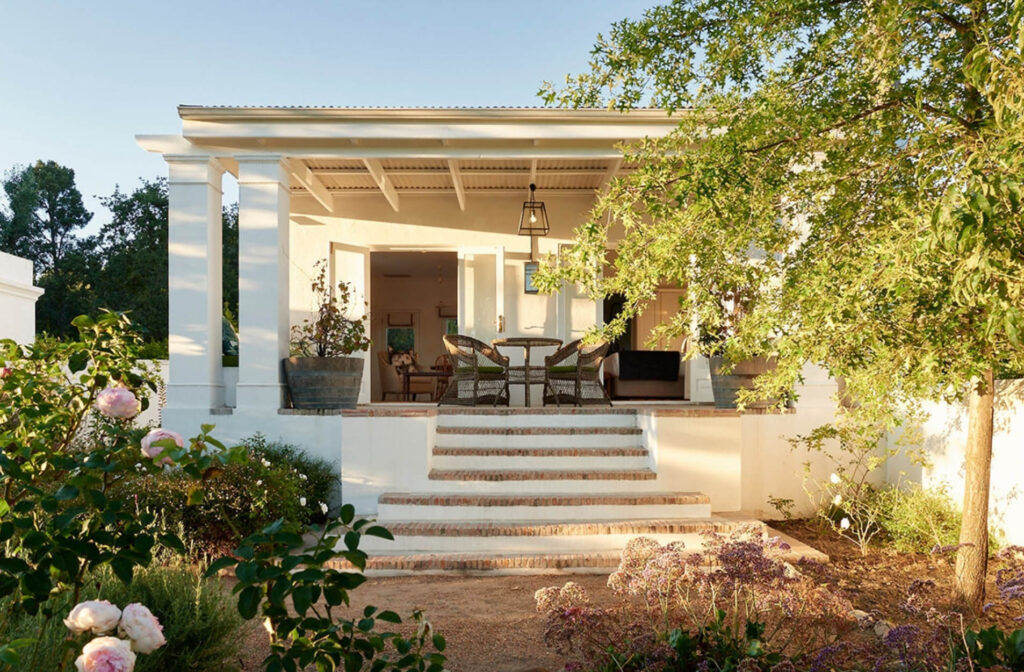
Gemtree Wines, McLaren Flat, South Australia
Certifications: Organic Certification, Sustainable Winegrowing Australia (S.A.W.) member
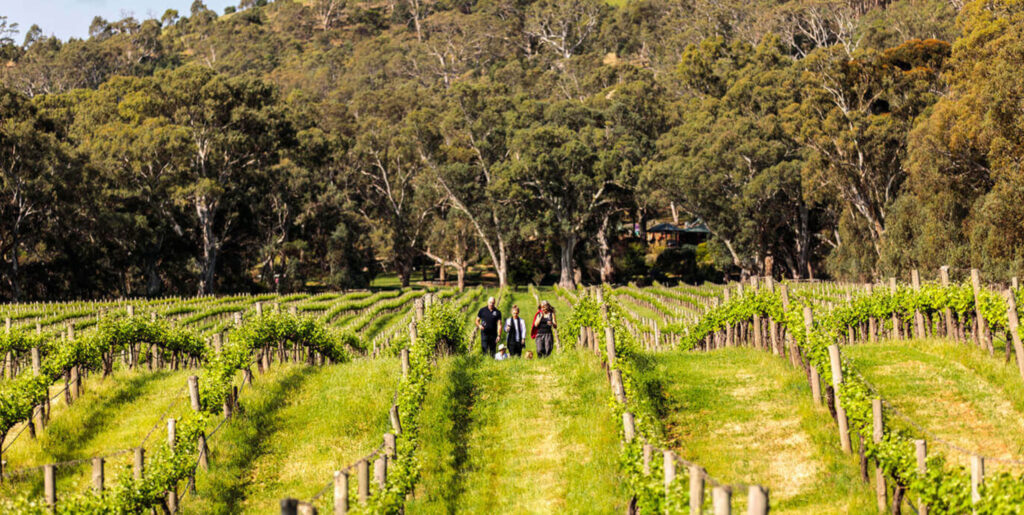
The first vines were planted in McLaren’s Vale in 1838, making them some of the world’s oldest. Gemtree uses natural alternatives to pesticides, herbicides, and fertilizers. They plant, graft, and harvest according to the moon’s phases, which affects how the plants grow and produce fruit. With recycled water and solar power, Gemtree is taking sustainable wine making and biodynamic farming seriously!
Taste & Tour Experience
Gemtree offers many ways to enjoy its wine:
- The Gemtree Tasting Experience: tasting flight of five wines, plus a complimentary Riedel glass to take home. Cost: $20
- The Gemtree Wine & Native Tasting Experience: Enjoy unique flavors with a native food plate with your flight of wine. Cost: $30
- Being Biodynamic: take a walk around the property with a guide and a glass of wine to learn about biodynamics, and complete the tour with a regional platter and another glass of wine. Cost: $80
- Wine and Wander: wander along the Gemtree Eco Trail and learn about winemaking at the Biodynamic Hut. Enjoy a tutored wine-tasting and private dining experience prepared by award-winning chefs. Cost: $180
- Wuldi Cultural Experience: join Ngarrindjeri elder Mark Koolmatrie on the Gemtree Eco Trail to hear ancient stories and explore responsibilities to the land and water. End with a tasting plate and wine flight. Cost: $125
- eBike Hire: rent an e-bike to explore the Gemtree Eco Trail and McLaren Flat differently! Cost: $75
Prefer to be more independent with your adventure? You can also pick up a picnic pack or barbecue pack and a bottle or two and explore the Gemtree Eco Trail on your own!
Lawson’s Dry Hills, Blenheim, New Zealand
Certifications: ISO14001 (Environmental Management) and ISO14064 (carbon zero) accreditations, Sustainable Winegrowing New Zealand

Lawson’s Dry Hills create wines from fruit grown in the Wairau, Waihopai, Omaka, and Awatere Valleys. Along with one of the lowest uses of power and water per liter of wine produced, they consider many factors when it comes to sustainability. Their lightweight bottles are made in New Zealand with at least 60% recycled materials, with biodegradable wine labels made from certified sustainably managed forests. With 200 solar panels powering 30% of production and rainwater recycling aiding in native wetland restoration, eco-friendliness is a priority at this winery!
Taste and Tour Experience
Sample Lawson’s Dry Hills Reserve wines with a chance to enjoy one of their limited Pioneer wines. A “pick your own platter” is also on offer with local cheeses, meats, pate, and salmon. You will also receive a packet of wildflower seeds during your visit!
Cost: Contact the winery to inquire about pricing.
Final Thoughts About Sustainable wine and tours
It’s becoming much easier to find eco-friendly and responsibly-made wines. Look for the aforementioned certifications and biodynamic agriculture practices when researching the right brands for you. If you live in a winemaking region, consider buying local to support the economy and save the transportation emissions!
And as always, please practice responsible wine consumption while you sip sustainably.
